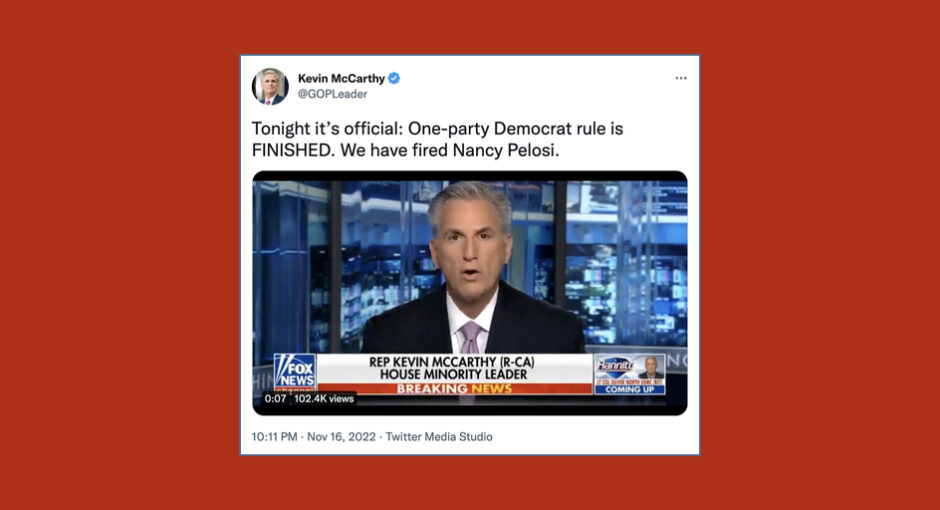The Republican Party won control of the U.S. House last evening, securing the requisite 218th seat for majority status after the Associated Press declared Rep. Mike Garcia (R) the winner of a race in California.
Democrats on Nov. 12 won control of the Senate for the next session of Congress that begins in January. The majorities in both chambers will be slim.
Republicans will be the majority party in the House Energy & Commerce Committee with jurisdiction over the 340B program. The last time the GOP controlled the committee from 2016 to 2018, it held numerous hearings on the program and considered—but did not pass—over a dozen Republican-sponsored bills that would have changed 340B to the benefit of drug manufacturers and detriment of covered entities. However, some GOP committee members pushed back at the restrictions and even pushed for legislation promoted by 340B providers.
Rep. Cathy McMorris Rodgers (R-Wash.) will be the new chair of the E&C Committee. She was considered an ally of covered entities about a decade ago. But as she rose in the House Republican leadership ranks, she spoke less publicly about 340B and her position on the program today is not known.
McMorris Rodgers, along with Sen. Richard Burr (R-N.C.), ranking Republican on the Senate Health, Labor and Pensions (HELP) Committee, recently requested a Government Accountability Office study about the March, 2022 law that enables hospitals to maintain or regain their 340B eligibility despite having fallen below the minimum required Medicare disproportionate share (DSH) adjustment percentage due to COVID-related changes in patient mix.
As part of the GAO study, the watchdog agency wants to know if 340B hospitals give low-income uninsured patients a break on drug prices at their contract and in-house pharmacies.
Why the GAO study is asking hospitals about sharing 340B drug savings with poor patients without insurance is unknown. Lowering what such patients pay for drugs is not a 340B program requirement (although many 340B covered entities say they do so). Nor is it a condition for a hospital to get its 340B eligibility restored through the end of this year under the new law.
It is possible that McMorris Rodgers and Burr asked GAO to look into this specific matter.
McMorris Rodgers chaired the House Republican Conference during the 113th, 114th, and 115th sessions of Congress (2013 through 2018). Only Minority Leader Kevin McCarthy (Calif.) and Minority Whip Steve Scalise (La.) ranked above her.
Rep. Elise Stefanik (N.Y.), one of the most stalwart 340B covered entity allies in all of Congress, is the current House Republican Conference chair.
Rep. Brett Guthrie (Ky.) is in line to be the next E&C Health Subcommittee chair. He was one of the GOP requestors of a December 2020 Government Accountability Office study on government audits and oversight of 340B covered entities. GAO found that, as of the end of September 2019, the U.S. Health Resources and Services Administration (HRSA) had issued just 23 findings of “duplicate discount-related errors at contract pharmacies,” and just 40 findings of “failure to oversee 340B program compliance at contract pharmacies,” in the 1,242 covered entity 340B program compliance audits it had conducted and finalized during the prior eight years.
HRSA told GAO in connection with the study that beginning in the fall of 2019, it started issuing adverse covered entity audit findings “only when audit information presents a clear and direct violation of the requirements outlined in the 340B program statute.”
Cassidy Will Be Top Republican on Senate HELP
On the Senate side of Congress, Sen. Rand. Paul (R-Ky.) announced this morning he is taking the top GOP slot on the Homeland Security and Governmental Affairs Committee. That means that Sen. Bill Cassidy (La.) will be the ranking Republican on the HELP Committee with jurisdiction over 340B.
In 2018, Cassidy sponsored legislation to impose a two-year moratorium on new disproportionate share hospital and child site registration in 340B. His bill also would have made it harder for DSH and children’s hospitals to register child sites after the moratorium, and would have required both types of hospitals to report their total revenues from 340B drugs, their patient mix broken down by payment source and child site, charity care expenses by child site, percentage of revenues at the child site level derived from infused or injected drugs, and all of the hospitals’ 340B vendors.
Cassidy has been a vocal critic of 340B program growth and has had tough questions for 340B provider and government representatives that testified on the 340B program before the HELP Committee in 2018.


